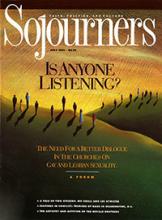IT FEELS PARTICULARLY APPROPRIATE that I should be writing this article during Holy Week, because coming out of the closet has been a resurrection experience. Every time the stone of fear is rolled away, and I can step out of the shadows of invisibility and silence into the light of daring to be seen and known and heard as a lesbian, I know once again in my bones that resurrection is real.
When I am able to act on the conviction that neither rejection, nor hatred, nor rupture of friendships, nor loss of a job, nor threatened violence can separate me from the love of God, I am living from a resurrection faith. I know that Easter is real. And I know what Richard Niebuhr meant when he once said: "I do not believe that death has been conquered because I know that Christ rose from the dead. I believe that Christ rose from the dead because I know that death has been conquered." No amount of teaching, preaching, or theologizing will convince us of the reality of resurrection unless we ourselves have walked into the valley of the shadow of death and experienced a presence that did not let us go.
It also feels appropriate that I should be writing this for Sojourners magazine, even after requesting two years ago that my name be removed from the masthead as a contributing editor. At that time I could not, any longer, be associated with the magazine that had published in 1985 the article by Richard Foster and had not adequately offered a rejoinder to that article.
Read the Full Article

